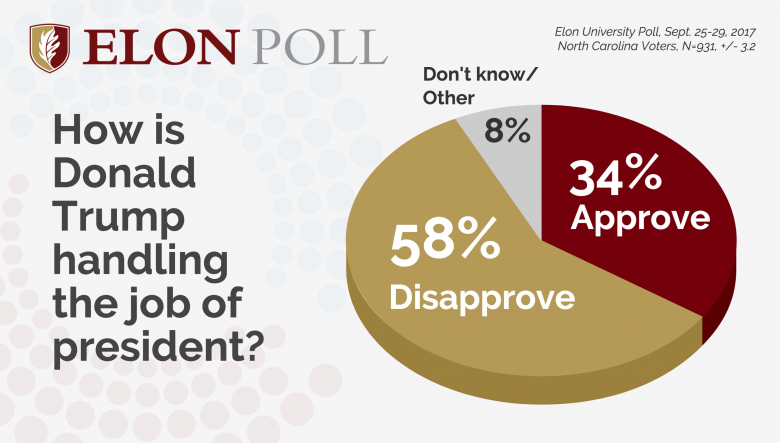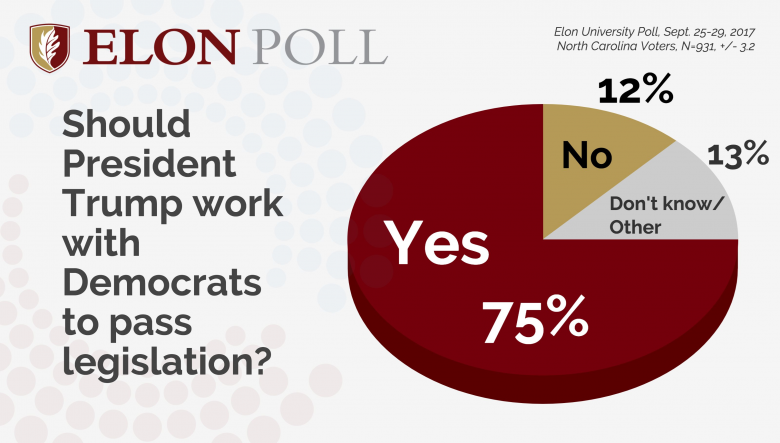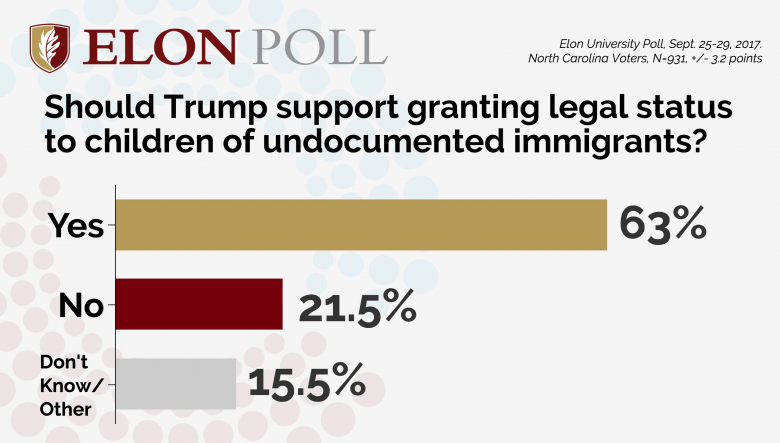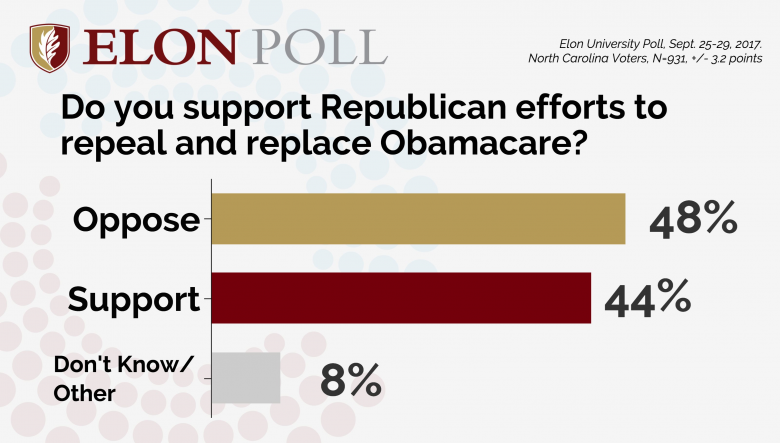The most recent statewide survey also asked about NFL player protests, Congressional action on Obamacare and DACA, and whether Confederate monuments should be removed.
FULL REPORT with METHODOLOGY & CROSSTABS
About a third of North Carolina voters approve of the job that Donald Trump is doing as president, with three out of four saying the Republican should make deals with Democrats to pass legislation, the most recent Elon University Poll has found. Asked how Trump has performed since he took office in January, 37 percent said he’s doing worse than expected while 16 percent say he’s doing better and 45 percent said he’s doing about how they expected.
“Like many Americans frustrated with gridlock in Washington, North Carolina voters as a whole want to see President Trump lead bipartisan deal-making in Washington,” said Jason Husser, director of the Elon University Poll and assistant professor of political science. “Democratic voters are more likely than Republicans to want bargains across the aisle, but our data suggest the president will have the support of most North Carolinians within his own party if he closes more negotiations like the recent debt ceiling extension.”

The Elon Poll also delved into the thoughts of N.C. voters on a variety of federal and state issues, including recent protests by NFL players, immigration reform, efforts to repeal the Affordable Care Act, whether Confederate monuments should be taken down, and the impact of climate change on the N.C. coast.
The Elon Poll asked whether the president should support legislation to grant legal status to the children of undocumented immigrants, an issue that was pushed to the forefront recently as the country continues to discuss immigration reform. The poll found that 63 percent said those children should be granted legal status, compared to 21.5 percent who said they shouldn’t.
Moving to the recent attempts by the Republican-controlled Congress to repeal the Affordable Care Act, often called Obamacare, the poll found voters split on the issue. Forty-eight percent said that they oppose Republican efforts to repeal and replace the Affordable Care Act and 44 percent said they support the move.
Asked whether they agreed with President Trump, who advocates firing NFL players who kneel in protest during the playing of the national anthem, close to two-thirds — 63 percent — said the players should not be fired while 30 percent said they should.
Delving into the ongoing controversy around Confederate monuments erected in public spaces, the poll found that 59 percent of N.C. voters believe that the statues of Confederate leaders and soldiers should remain in place while 29 percent said they should be taken down.
Finally, N.C. voters were asked their opinion about how climate change will impact the state’s coastal communities within in the next 50 years. Forty-seven percent said that climate change is very likely to have a negative impact on the N.C. coast, while 29 percent said somewhat likely and 18 percent said not likely at all.
The live-caller, dual-frame (landline and cell phone) survey of 931 registered voters in North Carolina was conducted Sept. 25-28, 2017. Survey results in this news release have a margin of error +/-3.2 percent.
President Trump
The president’s job approval among voters in North Carolina, a state he won last November, is low, with Trump seeing significantly lower ratings among Democrats than Republicans. Among Democrats, 92 percent said they disapprove of the job the president is doing while just 5 percent approve. Republicans had a much higher level of support but the results were not as lopsided as they were for Democrats, with 75 percent of Republicans saying they approve of the job Trump is doing and 13 percent saying they disapprove. Independents disapprove of the job the president is doing by a 57-34 margin.
“Critical to President Trump gaining North Carolina’s coveted electoral votes was his ability to convince a majority of independents that he was a better choice than Secretary Clinton,” Husser said. “As we approach the anniversary of Election Day 2016, the president has lost the support of many of those independent voters. Importantly, we also measured less robust support among voters in President Trump’s own party relative to President Obama’s support last year.”
Generally speaking, Trump’s disapproval numbers are higher among younger voters and those from urban areas, while he enjoys a higher level of support from older or rural voters. Only 5 percent of black voters approve of the job the president is doing, compared to 93 percent who disapprove. Women were more likely to disapprove of Trump than men, the poll found.

Many of those same demographic and party splits showed through when voters were asked about how the president is performing compared to what their expectations were when he took office in January. Thirty-nine percent of Republicans said he is doing better than they thought he would do, compared to just 4 percent of Democrats who hold that view. Among Republicans, 11 percent said the president is doing worse than they had thought he would do, while 61 percent of Democrats said Trump is doing worse.
Looking at other factors, voters who are older, white, male or from the rural parts of the state were more likely to say the president is doing better than expected. Black voters were far more likely than the general population to say Trump is doing worse than expected, with 63 percent holding that view compared to 37 percent overall.
President Trump recently made headlines when he worked with Democratic leaders in Congress on a deal relating to the country’s debt ceiling and hurricane relief, and the Elon Poll has found that voters in North Carolina would like to see more such deal-making going forward. Along with 84 percent of Democrats, 61 percent of Republicans and 78 percent of independent voters said the president should make deals with Democrats to pass legislation, even if it means working against Republicans in his own party. Older voters were a little less likely to hold that view, and urban voters were the most enthusiastic about the president working across the aisle.
DACA
The president last month rescinded an earlier policy — Deferred Action for Childhood Arrivals, or DACA — that provided legal protection for the children of undocumented immigrants who were brought to the U.S. by their parents, and said he would like to work on a replacement. Trump enjoys support for a replacement of some kind for DACA, with 63 percent of N.C. voters saying the president should support legislation to grant legal status to the children of undocumented immigrants, 22 saying the president should not support such a bill and 15 percent saying they don’t know.

Support for a replacement for DACA was strongest among Democrats, with 84 percent in favor and 9 percent opposed and 7 percent saying they don’t know. Republicans were split evenly on the issue, with 39 percent saying they support providing that legal protection, 39 percent saying they oppose such a move, and 21 percent saying they don’t know. Independent voters were supportive by a 63-21 margin, with a large section — 16 percent — saying they don’t know.
Obamacare
Party affiliation was the largest factor in determining what N.C. voters believe should lie ahead for the Affordable Care Act. Eight-seven percent of Republicans support efforts by their own party to repeal and replace the health care law, compared to just 12 percent of Democrats. Disregarding party affiliation, 44 percent of voters support a “repeal and replace” approach while 48 percent oppose that effort, roughly in line with the 44-46 split among independent voters.

A gender gap also exists, with male voters more likely to support repeal of the law, and white voters more likely than black voters to support the effort to replace the Affordable Care Act. Age seemed to have little influence on a voter’s opinion about the issue, with voters in all age groups having roughly the same level of support for “repeal and replace.”
NFL Protests
President Trump waded into the ongoing discussion about protests during the national anthem before NFL games, with some players taking a knee during the anthem. Speaking at a recent event, the president said that those players who take a knee during the anthem should be fired, a view the Elon Poll found is not shared by a clear majority of N.C. voters.
Looking more closely, the poll found clear differences of opinion based on race, age, gender and locale. Voters who are younger, black, female or from urban environments were all more likely to say that they disagreed with the president on the issue, with 63 percent overall disagreeing with Trump. Conversely, voters who are older, white, male or from rural areas of the state were more likely to side with the president, who saw 30 percent overall supporting him on the issue.
“Few emerging issues provide such a stark reflection of partisan and cultural divides as does the NFL protest controversy,” Husser said. “While a majority of North Carolina voters disagree with the president that NFL players who protest should be fired, white voters were twenty times more likely than African American voters to agree with President and Republicans were almost three times more likely to agree than were Democrats.”
Confederate monuments
North Carolina is home to dozens of statues and memorials to Confederate leaders and soldiers, with these monuments largely installed on public lands decades after the close of the Civil War. By a margin of 2 to 1, N.C. voters believe those monuments should remain in place, with 59 percent supporting the monuments staying where they are and 29 percent saying they should be taken down.
There are clear party and demographic divisions in North Carolina on the issue. Among Republicans, 88 percent believe the monuments should remain in place, compared to 36 percent of Democrats. Younger voters are less likely to say they should remain in place, but even among the youngest, Millennials, 54 percent say the monuments should stay.
More than a quarter of black voters — 26 percent — say the monuments should remain compared to 69 percent of white voters who hold that view. Rural voters are significantly more likely to advocate for the monuments to remain, with 71 percent holding that view compared to 44 percent of urban voters. Men and women were split on the issue by roughly the same margins.
N.C. coastal communities and climate change
This first fall statewide survey by the Elon Poll came after the Caribbean, Texas and Florida were battered by a series of catastrophic hurricanes. The Elon Poll asked in April 2017 how likely climate change is to negatively impact the coastal communities of North Carolina during the next 50 years, with 45 percent saying very likely, 28 percent saying somewhat likely and 23 percent saying not at all likely.
Now nearly six months later and following this series of serious storms, the proportion of N.C. voters saying climate change is somewhat or very likely has shifted little, with 47 percent saying very likely and 29 percent saying somewhat likely.
However, there has been a shift those holding other stances. The Elon Poll found that 18 percent say climate change is not at all likely to negatively impact the N.C. coast, down from 23 percent in the spring. The portion of voters who said they don’t know rose slightly from 3 percent in the spring to 5 percent last month.


